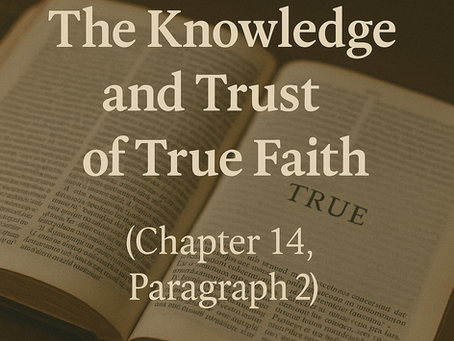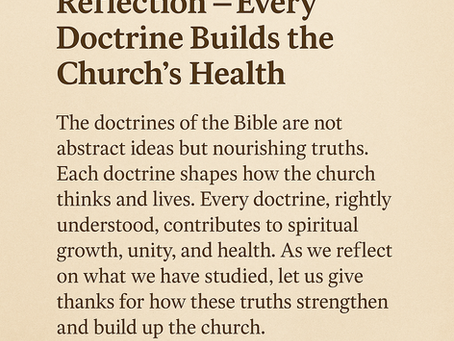top of page
Lighthouse Fellowship Reformed Church
Search
All Posts


The Father’s Delight in His Children
God the Father: Knowing the First Person of the Trinity He Delights Over You Many Christians believe the Father loves them—but struggle...
Sep 29, 20253 min read


3. Smyrna: Faithful in the Fire
The church in Smyrna was poor, pressured, and persecuted, yet Christ called them rich. Their suffering was not a sign of His absence but of their union with Him. He urged them to remain faithful unto death, promising the crown of life. Smyrna teaches us that true riches are in Christ, and that endurance in suffering proves the reality of faith.
Sep 28, 20253 min read


1. Christ’s Letters to His Church: Why They Still Matter
The seven letters in Revelation are not ancient relics—they are Christ’s living Word to His church today. In an age of cultural hostility, compromise, and spiritual apathy, we must ask: what kind of church are we? Christ walks among His lampstands, evaluating, warning, and encouraging. His Word cuts through excuses and calls us to repent and persevere.
Sep 28, 20253 min read


2. Ephesus: Orthodoxy Without Love
The Ephesian church was strong in doctrine but weak in devotion. Christ commended their vigilance against false teaching but rebuked them for abandoning their first love. Orthodoxy without love leads to lifeless religion. Christ calls us to repent, return, and rekindle affection for Him, promising eternal life to those who overcome.
Sep 28, 20253 min read


9. Again, What Kind of Church Are We?
The seven churches of Revelation expose strengths and failures that mirror the church in every age. Christ commends love, endurance, and fidelity, but rebukes loveless orthodoxy, compromise, dead religion, and lukewarmness. This letter to all churches calls us to examine ourselves: Are we faithful to Christ, or drifting from Him? Only conquerors in Christ will receive the promised crown.
Sep 28, 20253 min read


10. The Conquering Church: Christ’s Final Promise
Every letter to the seven churches ends with a promise “to the one who conquers.” Revelation closes by showing the ultimate reward: the new heavens and new earth, eternal fellowship with God, and freedom from death and sin. The conquerors are those who persevere in faith through Christ. Their victory is certain because it is grounded in His triumph.
Sep 28, 20253 min read


Day 24: Doctrine Shapes Fellowship
Fellowship flows from truth. Paul says the church grows as we “speak the truth in love” (Eph. 4:15). Real fellowship is not built on personalities or preferences but on doctrine. Berkhof noted that truth is the foundation of unity. Calvin wrote that Christ “binds us together by the bond of His truth.” Sound doctrine guards against false unity and produces true fellowship that glorifies God.
Sep 28, 20252 min read


The Knowledge and Trust of True Faith (Chapter 14, Paragraph 2)
Paragraph 2 explains that saving faith is more than mental assent—it includes knowledge, assent, and trust. True faith believes whatever is revealed in God's Word, especially the gospel. It receives Christ as the only Savior, trusts in Him alone for righteousness, and rests in God’s promises. This paragraph highlights that saving faith is not vague belief but a Spirit-enabled confidence in Christ and His work. It combines doctrinal conviction with personal dependence.
Sep 28, 20252 min read


The Father’s Sovereign Protection
God the Father: Knowing the First Person of the Trinity The Father Is Our Shield From Genesis to Revelation, the Father is portrayed as...
Sep 28, 20253 min read


Day 23: Doctrine Shapes Worship
Worship must be shaped by truth. Jesus said, “Those who worship Him must worship in spirit and truth” (John 4:24). Psalm 29:2 calls us to “ascribe to the Lord the glory due His name.” Joel Beeke notes that worship divorced from doctrine becomes idolatry. Doctrine safeguards the church’s worship, ensuring it is not built on human invention but grounded in God’s holiness and His revealed Word.
Sep 27, 20252 min read


The Gift and Grace of Saving Faith (Chapter 14, Paragraph 1)
Paragraph 1 teaches that saving faith is a gift from God, not a work of man. It originates from the sovereign grace of the Spirit and is normally brought about by the preaching of the Word. Faith enables a person to believe everything revealed in Scripture and trust in Christ alone for salvation. It is not generic belief, but a specific, Spirit-wrought trust in divine truth. Though sometimes strengthened by sacraments and other means, faith is fundamentally the fruit of regen
Sep 27, 20252 min read


Abba, Father: The Gift of Intimacy
God is not only the righteous Judge who justifies sinners; He is the loving Father who adopts them. This post explores the doctrine of adoption—how the Father brings rebels into His family through the work of the Son and the indwelling of the Spirit—and what this means for our identity, security, and inheritance.
Sep 27, 20253 min read


Day 22: Doctrine Shapes Preaching
Acts 2:42 shows that the early church “devoted themselves to the apostles’ teaching.” Preaching is not entertainment or opinion but the proclamation of God’s truth. Calvin wrote that preaching is “the public exposition of Scripture by the man sent of God.” Doctrine gives preaching substance, authority, and power. Without doctrine, sermons are empty words; with doctrine, they are life-giving truth.
Sep 26, 20252 min read


The Ongoing Battle Within (Chapter 13, Paragraph 2)
Paragraph 2 of Chapter 13 explains the reality of indwelling sin that remains even in sanctified believers. Though the reign of sin is broken, its presence persists. The Christian life is marked by an internal struggle between the flesh and the Spirit. This war does not invalidate one’s salvation but is evidence of spiritual life. Through the Spirit’s power, the regenerate man gains victory, even while often feeling the tension and sorrow of falling short.
Sep 26, 20252 min read


Our Adoption into the Father’s Family
Our Adoption into the Father’s Family More Than Just Forgiveness Justification declares you righteous. Adoption declares you beloved ....
Sep 26, 20253 min read


Day 21: Every Doctrine Builds the Church’s Health
Doctrine is not abstract theory but nourishing truth. Paul says the church grows “by speaking the truth in love” (Eph. 4:15). Each doctrine—about God, Christ, salvation, and the church—strengthens believers and unites the body. Calvin wrote that doctrine “is not a matter of the tongue, but of the life.” Every doctrine builds spiritual health, guarding against error and cultivating holiness
Sep 25, 20252 min read


The Work of God in Making Saints (Chapter 13, Paragraph 1)
Sanctification is the Spirit-wrought process of making believers holy in heart and conduct. Paragraph 1 teaches that it begins at regeneration and continues throughout the Christian life. Through union with Christ and the power of the Holy Spirit, sin’s dominion is broken, and the believer is enabled more and more to walk in righteousness. This progressive transformation is not our own doing, but flows from the merits of Christ and the Word of God applied to our hearts.
Sep 25, 20252 min read


The Father’s Joy in the Son’s Obedience
God the Father: Knowing the First Person of the Trinity The Delighted Father At Jesus’s baptism, heaven opened and the Father spoke:...
Sep 25, 20253 min read


Day 20: The Doctrine of the Church — Body, Bride, Temple
The church is Christ’s body (1 Cor. 12:27), His bride (Eph. 5:25–27), and His temple (Eph. 2:19–22). These images remind us that we are united to Christ, loved by Him, and indwelt by His Spirit. Calvin wrote that the church is “the mother of believers” who nurtures us in faith. Doctrine protects our view of the church, calling us to esteem her, love her, and walk faithfully within her fellowship.
Sep 24, 20252 min read


Adopted into the Family of God (Chapter 12, Paragraph 1)
“All those that are justified, God vouchsafed, in and for the sake of His only Son Jesus Christ…” The Father bestows the privilege of...
Sep 24, 20252 min read
bottom of page